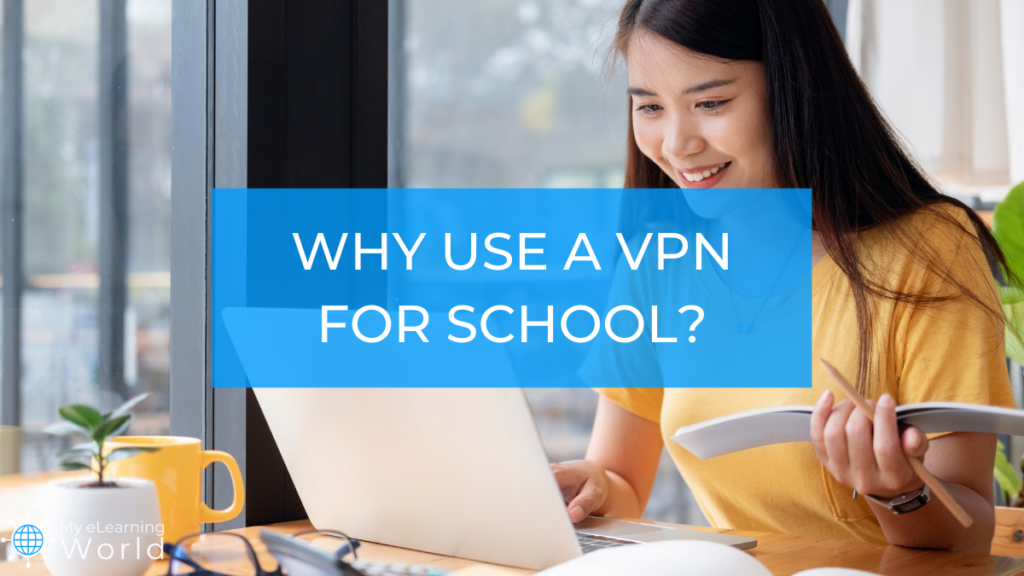The world of academia is growing more digital every year.
In 2009, classrooms reported an average of just one computer per five students.
Ten years later, surveys found that more than 95% of college students own personal laptops, and over 90% reported having a laptop as “very important to their coursework.”
As these numbers continue to grow, it’s important for college students to be mindful of their online safety.
Scams and data breaches have also been on the rise in recent years, with numbers jumping from 128 million in 2021 to 422 million in 2022, according to Forbes.
One of the best ways students can improve their security online is by using a VPN, or virtual private network service.
Read on to learn more about what VPNs are and how to choose one that can help you stay protected.
Disclosure: Some of the links in this article are affiliate links, meaning at no additional cost for you, we might get a commission if you click the link and purchase.
What Is a VPN?
A virtual private network, or VPN, essentially works as a safeguard when you’re using public internet access.
Most colleges and universities offer free Wifi on campus, which isn’t always strongly protected.
In fact, much of your online browsing can be tracked from these insecure connections, even if you opt for an Incognito window.
Chances are, this data tracking is relatively harmless – but there’s no guarantee.
The only way to stay truly anonymous (and out of the hands of data collectors and hackers) is by using a VPN service.
A VPN creates a digital connection between your computer or device and a remote server operated by the VPN provider.
This creates a secure, point-to-point tunnel to protect your information from being accessed by outside parties.
Most VPNs offer encryption to keep all of your data safe and anonymous. VPNs also mask your computer’s IP address (the online code that belies your geographic location), and can be used to sidestep firewalls and blocked sites.
Essentially, a VPN obfuscates your online activity, information, and location to any outside parties who might be trying to collect or harvest it.
Using a VPN is a wise precautionary measure for any internet access, but especially for public connections like those at universities, where security may not be robust.
How Can VPNs Help Students?
The increased security offered by a VPN is useful to students for a number of reasons.
Most importantly, VPNs keep your data and information from being collected, monitored, or hacked against your knowledge.
Using a VPN for school is the only way to make certain that your browsing history, data, and online identity remain anonymous when using a shared Wifi network.
VPNs can also detect and prevent viruses or scams from compromising the work you’ve saved on your device… especially important for those long, hard research papers you’ve worked on for weeks!
VPNs offer message integrity to protect against tampering with your information, and require authentication to ensure that outside parties can’t gain access.
This reduces the likelihood of phishing scams and malicious users jeopardizing your computer’s security through email.
A VPN is often useful for conducting online research, as well. Since it keeps your location confidential, VPNs make it possible to avoid censorship or geographic blocks to certain online databases and sites around the world.
Of course, VPNs can also be used for streaming and torrenting media. This activity is often forbidden on university networks, however.
It’s a good idea to double check your college’s internet guidelines before taking advantage of this VPN perk, just to be on the safe side.
Most universities have no problem with students employing VPNs for security, as long as their online activity is not violating any laws or school expectations.
How To Choose a VPN Service as a Student
 The Best Surfshark Deal – Get The Biggest VPN Discount
The Best Surfshark Deal – Get The Biggest VPN Discount
With Surfshark VPN, you can enjoy private, secure, fast, and unrestricted internet access from anywhere in the world.
It’s clear that using a VPN is a worthwhile step for any students who plan to access the internet on campus.
Choosing the right VPN, however, can be tricky. There are hundreds of options available, ranging from free offerings to monthly or yearly subscriptions.
The key to choosing the right VPN is to take stock of what it can actually do for you as a student.
After weighing several options, we found Surfshark’s VPN service to be by far the most comprehensive and protective option available.
Surfshark provides more sophisticated security measures than other VPN services on the market.
Not only is it specifically priced for students, but Surfshark is also optimally designed with students in mind.
For example, Surfshark is the only VPN service to offer Bypasser, a split tunneling tool that actually allows you to designate which sites will use your VPN.
This is perfect for students using university Wifi, as colleges will sometimes block certain databases when you attempt to access them by VPN.
Surfshark’s Bypasser feature allows users to simply turn off the VPN to reach those sites, without disabling it for other online activity.
This kind of convenience is consistent across the Surfshark platform, but rarely seen in other VPN options.
Surfshark also provides an option called multi-hop connectivity, designed to let you bounce your online traffic through a second VPN server for even more increased security.
Doubling up on security makes it even less likely that your information will be compromised while you use your university internet.
Surfshark includes a number of other security features too, including an advanced adblocker called Cleanweb and a custom DNS service called Smart DNS that enables you to securely access content from around the globe.
Security bundles like Surfshark One and Surfshark Incogni are also available to ramp up your cybersecurity even further.
These options provide real-time protection and virus scanning while keeping your data safe from malicious online collectors.
For students on the go, Surfshark is one of the most globally connected VPN services on the market today.
In fact, Surfshark offers servers in more than 100 countries, including locations in South America and Africa. Surfshark also works in China and Ukraine, places many VPN services cannot accommodate.
Surfshark’s dedication to global access means that you’ll be able to stay securely connected wherever you find yourself on earth, which is not true for many of the free options available.
What Does a Good VPN Service Cost for Students?
Because Surfshark offers such comprehensive protection features, it’s not offered for free.
Thankfully, though, the price per month averages out to less than you’d pay for one latte to fuel a late-night study session.
With Surfshark’s current student discount for our readers, you can be confident in your online security for only $2.30 per month.
Taking advantage of Surfshark’s student discount means you’ll be getting your VPN for two months free of charge.
In total, Surfshark’s student discount represents a whopping 82% off their usual two-year price plus two months of free service when you use this link.
This deal makes it easy for college students to invest in top-tier digital safety instead of risking the use of a free VPN service that doesn’t offer all of Surfshark’s rigorous security measures.
How To Make Sure Your VPN Service is Trustworthy
Even though Surfshark is highly affordable, it’s always a good idea to look into a service’s trustworthiness before agreeing to payment.
Surfshark’s Privacy Policy and Terms of Service are written in straightforward language, making them easy to read and digest.
The company makes it clear that they do not store network traffic, bandwidth, IP addresses, or browsing history from their customers.
In keeping with their vision, Surfshark does not track or profit in any way from user data.
Instead, Surfshark’s entire business model revolves around the sale of subscriptions (like those offered to students at an 82% discount).
These privacy guarantees are essential factors to check for when choosing a VPN service.
Many free or cheaper options may claim to create anonymity or confidentiality, but cannot guarantee that user information will not still be somehow stored or saved by the VPN service itself.
Paying just over 2 dollars a month is a fair exchange for the high value and assured security Surfshark provides.
Final Thoughts on Using a VPN as a Student
Your time as a college student should be rewarding and full of growth. It’s the perfect opportunity to progress, learn, and fulfill your potential.
Taking steps to protect your online identity makes it easier to focus on achieving your goals as a student.
It’s important to know that your hard work, research, and personal data won’t be compromised during your time at university, regardless of the network you’re using.
The best way to guarantee your security is by using a high-quality VPN service like that offered by Surfshark. It’s one of the best internet safety tips for students.
Surfshark creates a safe digital connection between your device and a remote server, making it impossible for your data and information to be hacked and tracked.
Surfshark also offers convenient, rarely seen features that let you bypass your VPN for certain sites, multi-hop for increased security, employ real-time virus or hacking scans, and connect to servers in remote countries while traveling.
Since it’s specially priced for students at only $2.30 per month, with two free months included (82% off the usual two year price when you use our link), Surfshark is a much better value than less reputable free VPN sites.
No one wants to deal with the disastrous aftermath of a personal data breach, especially as a busy college student.
Using a trustworthy VPN service like Surfshark can help you breathe a sigh of relief that it won’t happen to you.


